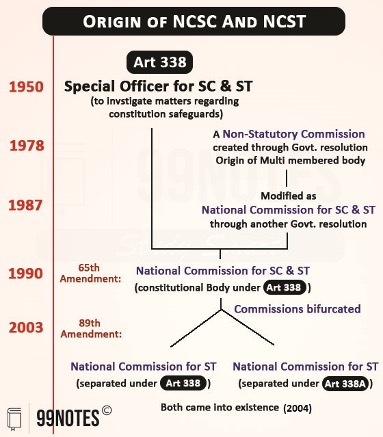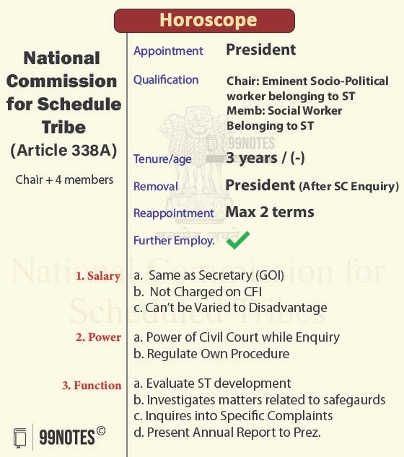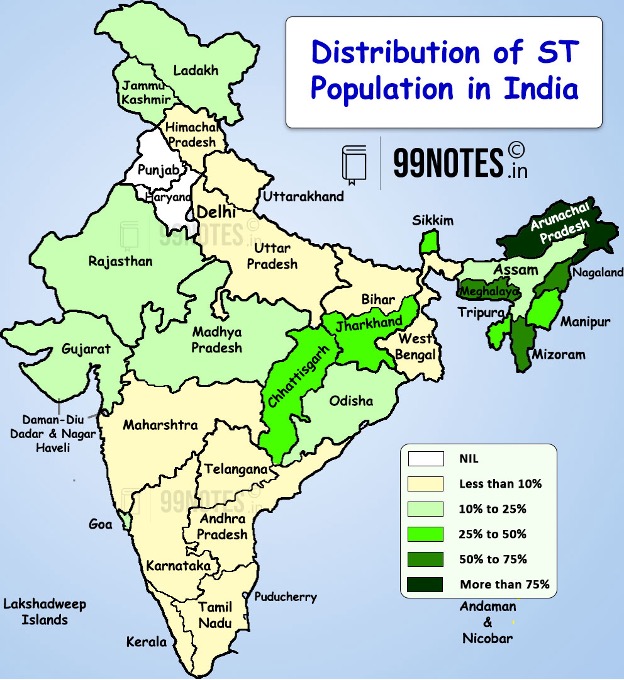National Commission for Scheduled Tribes- UPSC Notes
National Commission For Scheduled Tribes
- National Commission For Scheduled Tribes
- Features of the National Commission for Schedule Tribe
- Functions of the National Commission for Scheduled Tribes (NCST):
- Report of the National Commission of Scheduled Tribes:
- Powers of the National Commission for Scheduled Tribes (NCST):
- Concerns related to the National Commission for Scheduled Tribes:
- Way forward:
- Conclusion
- FAQs related to National Commission for Scheduled Tribes
The National Commission for Scheduled Tribes (NCST) was added to the Constitution under Article 338A by the 89th Constitutional Amendment Act, 2003, to safeguard the rights of the Scheduled Tribes.
Scheduled Tribes:
Under Article 366, the Constitution prescribes that scheduled Tribes are such Tribes or tribal communities as are given under Article 342.
Article 342: The President, with the consultation of the Governor of the State, may specify the tribes or tribal communities or any part of or groups within tribes or tribal communities as a scheduled Tribe.
- Parliament may, by law, include or exclude scheduled tribes from the list of Scheduled
- Over 700 tribes have been notified under Article 342 of the Constitution of India. It spread over different States and Union Territories of the country.
- The largest number of tribal communities (62) has been specified in the State of Orissa. The Scheduled Tribes have been identified in all the States and Union Territories except Punjab, Chandigarh, Haryana, Delhi, and Pondicherry.
How Schedule Tribe is recognized?
| Lokur Committee, 1965 |
The Lokur committee gave the following criteria for the recognition of any community as Scheduled Tribes:
However, the above criteria are not mentioned in the Constitution. |
Difference from Scheduled Castes:
- The Scheduled Tribes are distinct from Scheduled Castes regarding geography and culture. Tribal communities live in different geo-climatic and ecological conditions that include plains, forests, hills and inaccessible areas. Some tribal communities have adopted a mainstream way of life.
- The Scheduled tribes are the most underprivileged section of society, and the problems of Scheduled caste and scheduled tribes are distinctly different and need a separate strategy for the identification of gaps and disparities amongst them.
- Further, some tribal communities known as PVTGs (Particularly Vulnerable Tribal Groups) are still characterized by using pre-agricultural technology, extremely low literacy, declining population and subsistence level of technology.
Separate Commission for Scheduled Tribes:
By the Constitutional Amendment Act 2003, the erstwhile National Commission for Scheduled Castes and Scheduled Tribes was bifurcated into two separate commissions, namely:
- National Commission for scheduled caste under Article 338.
- National Commission for Scheduled Tribes under Article 338A
To protect the interest of the Scheduled Tribes, a separate National Commission for Scheduled Tribes came into existence in 2004.
Features of the National Commission for Schedule Tribe
- Composition of the National Commission for STs: It includes a chairperson, Vice-Chairperson and three other members.
- The chairperson has been given the rank of Cabinet Minister, the vice chairperson has the rank of Minister of State, and other members have the rank of Secretary to the government of India.
- Appointment: the members are appointed by the President by warrant under his hand and seal.
- Qualification: as per the National Commission for Scheduled Tribes Chairperson, Vice-Chairperson and members (Conditions of Services and Tenure) rules, 2004,
- The Chairperson, the Vice-Chairperson, and the Members shall be appointed from amongst persons of ability, integrity, and standing who had a record of selfless service to the cause of justice for the Scheduled Tribes.
- The chairperson shall be appointed from amongst eminent sociopolitical workers belonging to the Scheduled tribes.
- Vice-Chairperson and all other members, out of whom at least 2 shall be appointed from amongst persons belonging to the Scheduled Tribes.
- At least 1 other member shall be appointed from amongst
- Condition of service and Tenure of office: The Constitution empowers the President of India to determine the condition of services and tenure of the members.
- Term of the office: The members of the commission hold office for a term of three years as per the rules made by the
- Resignation: The chairperson, and Vice-Chairperson, and any other member may resign from his post, writing to the President.
- Removal: The chairperson shall only be removed from his office by the President’s order on the grounds of misbehaviour after the Supreme Court’s enquiry.
- The Chairperson, the Vice-Chairperson and the other Members shall be eligible for appointments for up to two terms.
- Kunwar Singh Tekam was the first chairman of the National Commission for Scheduled Castes. Until now, 6 National Commissions for scheduled castes have been constituted.

Functions of the National Commission for Scheduled Tribes (NCST):
Under Article 338A(5) of the Constitution of India, the following functions have been enumerated:
- Investigate safeguards-related matters: the commission monitors and looks into issues relating to the constitutional and other legal safeguards to the scheduled tribes and reviews their workings.
- Enquires into specific complaints: The Commission looks into the particular complaints related to the deprivation of rights and safeguards of the Scheduled tribes.
- Advice on the planning process: It participates in and provides suggestions on the planning process for the socio-economic development of the scheduled tribes and reviews the workings and progress of their development under a union or a state.
- Presents the report: The commission may submit the report annually or at other times as the Constitution may specify to the President on the working of the safeguards.
- Recommends union or a state: recommends union or to any state regarding the effective implementation of the safeguards and the protection, welfare and socio-economic development of the Scheduled Tribes.
- Consultation Functions: Both the union and state governments needed to consult the commission on all significant policy matters that affected the scheduled tribes.
- Other functions: Discharge those functions specified by the President or any law or rule. The functions include the policies and programmes that cater to the protection, welfare, development and advancement of STs.
Other Functions specified by the President under Article 338A(f):
The President mentions the following additional functions of the commission relating to the protection, welfare development and advancement of the Scheduled Tribes in 2005 [Article 338A(f)]:
- Granting ownership rights: Steps must be taken regarding giving ownership rights in relation to minor forest produce to Scheduled Tribes residing in forest areas.
- Protection of rights: Steps to be taken to protect the rights of the tribal population over various resources such as mineral resources and water resources as per law.
- Development projects: Steps to be taken to promote the development of tribal people and to work for more viable livelihood strategies.
- Rehabilitation measures: Steps to be taken to provide relief and rehabilitation for tribal groups displaced by development projects
- Prevent Alienation: To prevent alienation from land and to effectively rehabilitate such people in case alienation has already taken place.
- Seeking cooperation: Steps ought to be taken to extract maximum cooperation and involvement of tribal communities to protect forests and undertake social forestry.
- Steps were taken to ensure the effective implementation of the provisions of the Panchayats (Extension to the Scheduled Areas) Act, 1996 (PESA Act).
- Eliminating the practice of shifting cultivation: Steps must be taken to reduce and eventually eliminate the practice of shifting cultivation by tribals because it leads to the degradation of land and environment.
Report of the National Commission of Scheduled Tribes:
- Presents the annual report: It is the commission’s responsibility to present a report to the President annually, and the commission may also submit a report whenever it deems fit.
- President places it in the Parliament: All of these reports are presented to the parliament by the President together with a memorandum outlining the steps taken in response to the commission’s recommendation.
- It must include the rationale for the rejection of every one of these recommendations.
- The President forwards it to the Governor: It is also the President’s responsibility to forward any report of the commission appropriated by the state government to the governor.
- The Governor further places it before the State legislature, together with a memorandum explaining the action taken on the recommendations of the commission.
- The memorandum also includes the rationale for the rejection of these recommendations.
Powers of the National Commission for Scheduled Tribes (NCST):
The Constitution empowers the commission under Article 338A (4) to regulate its procedure. The commission has the powers of a civil court while investigating any matters or inquiring into any complaint in particular with respect to the following matters:
- It can examine a person on
- It can summon and enforce the attendance of any person and examine it on oath.
- It can order the discovery and production of any documents and receive evidence on affidavits.
- It can obtain any public record from a court or office.
- It can issue summon for the assessment of witnesses and documents
- Any other matter which the President may
Concerns related to the National Commission for Scheduled Tribes:
- Dysfunctional: As per the parliamentary committee report, the National Commission for Scheduled Tribes has been nonfunctional for over four years as it has not submitted any report in this period.
- Pending Reports: Several reports of the committees are pending, such as
- A special report on rehabilitation and resettlement of displaced tribal due to Rourkela Steel Plant and
- Report on the consequences of the Indira Sagar Polavaram project in Andhra Pradesh on the tribes in the region.
- Shortages of human resources: Recruitment in the commission was constrained because of a lack of applicants, as the eligibility bar was set too high. For instance, as per the commission’s website, it has met only four times in the financial year 2021-22.
- Pending complaints resolution: The rate of the resolution of complaints and cases that the commission receives is close to only 50%; thus, there is increased pendency of cases.
- The commission also needs more and a separate budget
| Separate Ministry for Schedule Tribe |
|
Way forward:
- Urgent Recruitment: the position of the chairman is still vacant, making the body headless and functioning with a lone member. Thus, the position must be filled on an urgent basis.
- Separate and sufficient budget allocation should be made to enable the commission to work hassle-free.
- The commission should not only work toward ensuring justice but also proactively work to prevent injustice.
- The commission should engage with the government when it comes to planning socio-economic development schemes for Scheduled tribes and prevent atrocities against them.
- Strict implementation of the laws related to the SCs and STs, such as scheduled caste and Scheduled Tribes (Prevention of Atrocities) Act, 1989, to prevent atrocities and prohibit offences against Scheduled castes and scheduled Tribes.
Conclusion
Schedule Tribes are the most underprivileged section of society. Thus, they need a targeted approach for their socio-economic and political welfare. In this aspect, NCST can play an important role in their holistic development by safeguarding their rights. There is a lot of diversity in the Schedule Tribe of India. Thus, there is a need for deep understanding with a localized approach to their welfare, and NCST has to play a proactive role in their comprehensive welfare.






